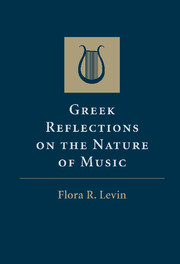Book contents
- Frontmatter
- Contents
- Figures
- Preface
- Introduction
- Abbreviations
- Texts
- 1 All Deep Things Are Song
- 2 We Are All Aristoxenians
- 3 The Discrete and the Continuous
- 4 Magnitudes and Multitudes
- 5 The Topology of Melody
- 6 Aristoxenus of Tarentum and Ptolemaïs of Cyrene
- 7 Aisthēsis and Logos: A Single Continent
- 8 The Infinite and the Infinitesimal
- ΣΦPAΓIΣ
- Bibliography
- Index
7 - Aisthēsis and Logos: A Single Continent
Published online by Cambridge University Press: 21 October 2009
- Frontmatter
- Contents
- Figures
- Preface
- Introduction
- Abbreviations
- Texts
- 1 All Deep Things Are Song
- 2 We Are All Aristoxenians
- 3 The Discrete and the Continuous
- 4 Magnitudes and Multitudes
- 5 The Topology of Melody
- 6 Aristoxenus of Tarentum and Ptolemaïs of Cyrene
- 7 Aisthēsis and Logos: A Single Continent
- 8 The Infinite and the Infinitesimal
- ΣΦPAΓIΣ
- Bibliography
- Index
Summary
The heart is the capital of the mind,
The Mind is a single State.
The heart and the Mind together make
A Single continent.
Emily Dickinsonin the fourteenth century, a viennese scribe, the copyist of Porphyry's Commentary on Ptolemy's Harmonics, known to us only as T, referred to Ptolemaïs' definition of the canon as that of Ptolemaïs the Cyrenian Musician (ὃρος κανóνος παρà πτολεμαΐδος τῇς κυρηναíας μουσικῇς). The knowledge and mastery of the material displayed throughout by T in his various interpretive corrections and refinements of Porphyry's text lend an uncommon authority to his characterization of Ptolemaïs as mousikē. To be sure, T may have been using mousikē here in the general sense of “cultivated,” thus to designate a person educated “under the auspices of the Muses.” And this reading – “the Cyrenian Savante” or “woman of letters” – would comport with one other rare mention of Ptolemaïs, that by Gilles Ménage, in whose Historia Mulierum Philosopharum of 1690 Ptolemaïs of Cyrene is acknowledged as a scholar and philosopher. Observing Ptolemaïs at work, however, and watching the results of her constant venture into the “Battle of the Criteria” – Aisthēsis and Logos – lead to a certain conclusion: she was mousikē, a musician in the narrower sense of the word. When, therefore, T called Ptolemaïs mousikē, he must have had the same thing in mind as Porphyry did when he called Didymus mousikos, namely, a musician. Indeed, T was evidently too clear-sighted not to perceive that in the debate between the Aristoxenians and the Pythagoreans, Ptolemaïs spoke as a musician.
- Type
- Chapter
- Information
- Greek Reflections on the Nature of Music , pp. 241 - 295Publisher: Cambridge University PressPrint publication year: 2009

